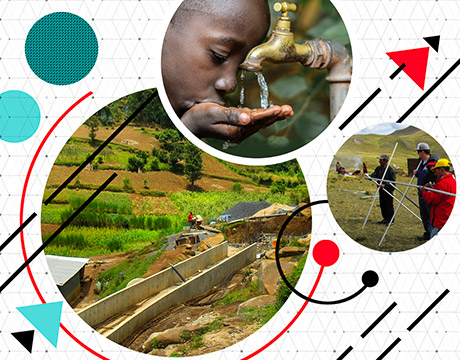5 Reasons for Engineers to Give Back
5 Reasons for Engineers to Give Back


The work of engineers is intertwined with every aspect of society. They apply their skills and expertise to the bridges we drive over, the irrigation systems that sustain our agriculture, the machines that save our lives, and so much more.
In other words, engineers are indispensible to our very way of life.
There’s a lot of good that can be done with those essential skills — and not just through a day job. There are a number of volunteer and charitable opportunities specifically designed for engineers to lend their unique and valuable skill set to the community. Dozens of organizations, such as Engineers Without Borders, exist for this very purpose.
And using your engineering skills to give back isn’t just incredibly valuable to the world at large — it’s also beneficial for you.
Some of our volunteers have said that they've reached a point in their career where they feel like they have more to offer. Jaclyn Wilmot, Engineers Without Borders USA
Here are some of the top reasons why engineers should give back to their community:
1. Hone your skills
If you’re an engineer just starting out in the field, or if you’re a college student currently pursuing your degree, volunteering can be a great way to get your foot in the door professionally.
For instance, Engineers Without Borders’ flagship program, the International Community Program, offers volunteers the opportunity to adopt a community project and work on engineering solutions around the world. Last year alone, volunteers worked on about 700 projects across 46 countries, says JaclynWilmot, volunteer engagement director for Engineers Without Borders USA.
Many of the program’s volunteers are college students who are experiencing for the first time the engineering project process from beginning to end — from assessment to design to sourcing sustainable materials to implementation. It’s an experience you simply can’t get in the classroom, and it’s one that could set you apart from the competition.
“Oftentimes in school, you're getting some really great theoretical knowledge, Wilmot says “You're reading books. You're taking tests. You're really learning the ins and outs of the field. But to have that field experience really makes them a strong candidate for their future careers.”
2. Gain new experiences
More seasoned engineers can gain unique engineering experiences they may not have access to in their day jobs. The Engineering Service Corps program, for instance, is designed for highly skilled professional volunteers who lend their services to disaster recovery, agriculture, and sanitation projects across the globe.
“Some of our volunteers have said that they've reached a point in their career where they feel like they have more to offer, and they're able to do something that they're not able to do in their professional job,” Wilmot says. “Some of our more seasoned engineers are retired, and this a way for them to continue sharpening their skill and utilizing their talents in a way that's real exciting for them, and really feels impactful.”
For You: Engineers Break Down Borders
3. Sharpen non-engineering skills
Another way to get involved in nonprofit work is to join a local chapter. Becoming an officer of a chapter is like running a small business. Doing so helps you develop a versatile set of skills, such as project management, budgeting, working with people, and solving problem.
“You need to recruit for the right talent, hold regular business meetings, decide on projects that you'll pursue, put project teams together, fundraise, market, communicate,” Wilmot says “So there are a lot of basic business elements that come into play, which really translate into the professional world,” she says.
4. Become a mentor
If you’re a veteran professional, volunteering for nonprofit or charitable organizations can give you the chance to mentor students and recent graduates. Engineering Without Borders requires professional mentors to be paired with up-and-comers for engineering projects. It’s a mutually beneficial experience.
“The veteran gets to take the next generation of engineer under their wing, teach them what they know, and also learn from them,” Wilmot says. “I think that knowledge-sharing is exciting, and to be able to shape the next generation of engineers is really impactful for our more seasoned volunteers,” Wilmot says
5. Improve your resume
It’s always good to approach volunteering with philanthropic motivation, but it certainly doesn’t hurt to consider your own career prospects. Giving back to your community is a great resume enhancer.
Current and prospective employers alike look highly on those kinds of experiences.
“Our corporate partners tell us that they love the fact that they can work with Engineers Without Borders to recruit some of these recent graduates,” Wilmot says. “They say that these students are anywhere from four to five years ahead of other recent grads in the same field because of the experience they've received through EWB-USA.”
Tim Sprinkle is an independent writer.
Read More:
Creative Approach to Engineering Improves Grades
How to Raise a Coder in Four Easy Steps
Levitating with a Tornado of Sound Waves




